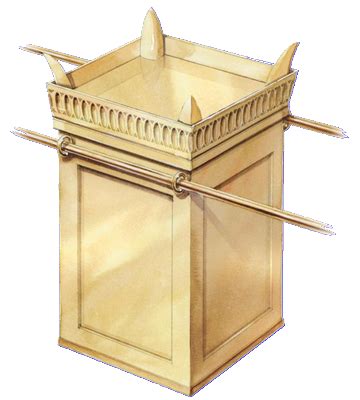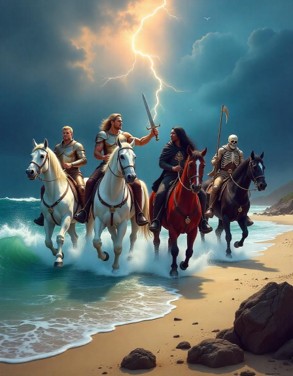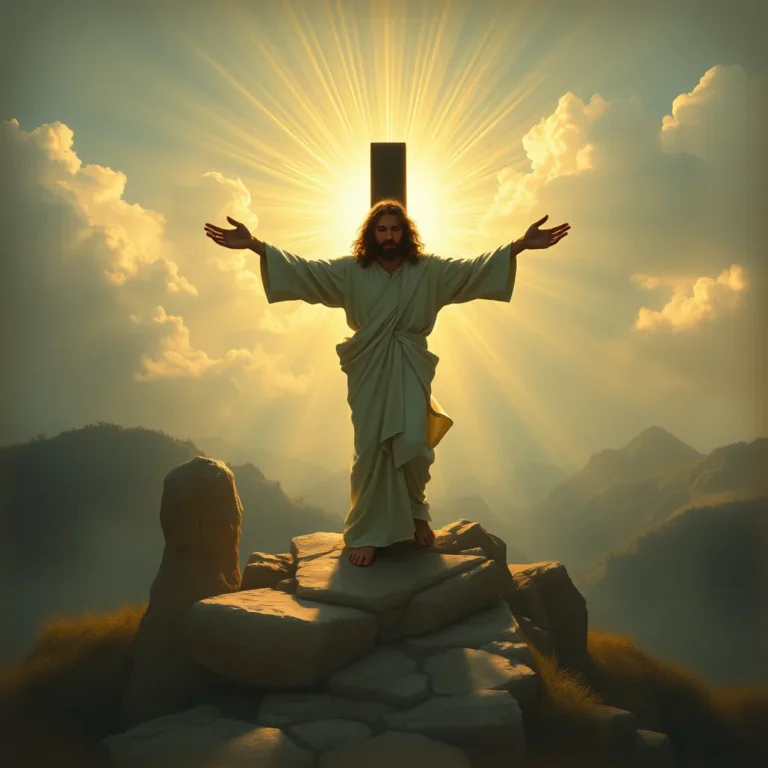
(*All Bible verses are from the NIV unless otherwise noted)
Chapter 9
11 They had as king over them the angel of the Abyss, whose name in Hebrew is Abaddon and in Greek is Apollyon (that is, Destroyer).
12 The first woe is past; two other woes are yet to come.
13 The sixth angel sounded his trumpet, and I heard a voice coming from the four horns of the golden altar that is before God.
14 It said to the sixth angel who had the trumpet, “Release the four angels who are bound at the great river Euphrates.”
15 And the four angels who had been kept ready for this very hour and day and month and year were released to kill a third of mankind.
9:16 The number of the mounted troops was twice ten thousand times ten thousand. I heard their number.
Rev 9:11
They had as king over them the angel of the Abyss, whose name in Hebrew is Abaddon, and in Greek, Apollyon:
In the immediate sense, John’s vision revealed the advance of misery and destruction, illustrated by armored locusts. The king over this evil host would be the “Angel of the Abyss.” The Hebrew name Abaddon1 and the Greek equivalent, Apollyon2, both mean “destroyer” or “destruction.”

Job 26:6 The realm of the dead is naked before God; Destruction [abaddon] lies uncovered.
Prov 15:11 Death and Destruction [abaddon] lie open before the LORD—how much more do human hearts!
The king of the Abyss is identified in Rev 20:1-3 as that “ancient serpent, who is the devil, or Satan.” His subjects are those who love evil:
Rom 3:12 All have turned away, they have together become worthless; there is no one who does good, not even one.” 13 “Their throats are open graves; their tongues practice deceit.” “The poison of vipers is on their lips.” 14 “Their mouths are full of cursing and bitterness.” 15 “Their feet are swift to shed blood; 16 ruin and misery mark their ways, 17 and the way of peace they do not know.” 18 “There is no fear of God before their eyes.” 3
Ellicott observes:
The great movement is no mere undesigned or instinctive one, but the offspring of a hidden, spiritual force. The great battle is not on the surface only, the invasions, revolutions, and tyrannies, which try and trouble mankind, involve spiritual principles and are but tokens of the great conflict between the spirit of destruction and the spirit of salvation, between Christ and Belial, God and Mammon, the Prince of this world and the Prince of the kings of the earth.4
Rev 9:12
The first woe is past; two other woes are yet to come:
The term woe, (Greek, οὐαί [ou-ai’], Hebrew, howy [hoh’ee]), conveys the feeling of a deep sigh of sadness or despair rather than angry judgment:
Ps 120:5 Woe to me that I dwell in Meshek, that I live among the tents of Kedar!
Matt 18:7 Woe to the world because of the things that cause people to stumble! Such things must come, but woe to the person through whom they come!
John Mark Comer writes:
Woe is a fascinating word choice. It’s not actually a word. It’s just a vocal expression of emotion. Ohh is the positive version, the way we express surprise or delight when confronted with unexpected good. Woe is the negative version, the sigh of the heart. For years, I read this in a hellfire-and-brimstone tone of voice, the bullhorn turned up to eleven—“Woe to those who call evil good!” And, honestly, that could be right. But the more time I spend around the Father, the Son, and the Spirit and experience their love and compassion, the more I hear it in the tone of a weeping parent, heart rent open by the child’s folly and the consequences it will inevitably reap.5
Rev 9:13
The sixth angel sounded his trumpet, and I heard a voice coming from the horns of the golden altar that is before God:

Review the symbolism of the altar, its horns, and the smoke from the incense (Rev 5:6, 8:4). The Jewish Encyclopedia explains that the Hebrew name for the altar, mizbeach (miz-bay’-ach), signifies the wiping away of sin, the nourishing of the higher self, the fosterment of love for God, and the atonement for all guilt6.
The ancient priests took the blood from the sacrificed animal and smeared some on the horns of the altar, which symbolized atonement and God’s mercy7.
There was another altar, one covered with gold, where incense was offered with prayers for the people:
Exod 39:38 the gold altar, the anointing oil, the fragrant incense, and the curtain for the entrance to the tent;
Lev 2:2 …The priest shall take a handful of the flour and oil, together with all the incense, and burn this as a memorial portion on the altar, a food offering, an aroma pleasing to the LORD.
Rev 8:3 Another angel, who had a golden censer, came and stood at the altar. He was given much incense to offer, with the prayers of all God’s people, on the golden altar in front of the throne.
John hears a voice coming from this altar – the prayers of the saints crying for justice:
Rev 6:10 They called out in a loud voice, “How long, Sovereign Lord, holy and true, until you judge the inhabitants of the earth and avenge our blood?”
Rev 9:14
Release the four angels who are bound at the great river Euphrates:
The Euphrates River was the eastern frontier of the Roman Empire and the natural northern frontier of Israel:
Josh 1:3-4 I will give you every place where you set your foot, as I promised Moses.Your territory will extend from the desert to Lebanon, and from the great river, the Euphrates—all the Hittite country—to the Mediterranean Sea in the west.
In 732 BC, the Assyrian Empire swept down from the north and conquered the northern kingdom of Israel. It forcibly relocated much of the population throughout its empire, and ten of Israel’s tribes disappeared from history. In 597 BC, the armies of Babylon crossed the Euphrates, burned Jerusalem, sacked the Temple, and carried away many of the Jews to Babylon, where they remained in captivity for seventy years:
1Chr 5:26 So the God of Israel stirred up the spirit of Pul king of Assyria (that is, Tiglath-Pileser king of Assyria), who took the Reubenites, the Gadites and the half-tribe of Manasseh into exile. He took them to Halah, Habor, Hara and the river of Gozan, where they are to this day.
Isa 14:31 Wail, you gate! Howl, you city!Melt away, all you Philistines!A cloud of smoke comes from the north,and there is not a straggler in its ranks.
Jer 1:14 The LORD said to me, “From the north, disaster will be poured out on all who live in the land.
Jer 6:1 “Flee for safety, people of Benjamin!Flee from Jerusalem!Sound the trumpet in Tekoa!Raise the signal over Beth Hakkerem!For disaster looms out of the north,even terrible destruction.
Ezek 26:7 “For this is what the Sovereign LORD says: From the north I am going to bring against Tyre Nebuchadnezzar king of Babylon, king of kings, with horses and chariots, with horsemen and a great army.
Finally, in 63 BC, Roman Legions, under the command of Pompey, marched in from the north, subjugated Palestine, desecrated the Temple, and brought the Jewish kingdom under Roman rule. The Jewish queen, Alexandra-Salome, had died, and her kingdom was in the throes of a bloody civil war. The queen’s two sons, Hyrcanus and Aristobulus, contended for power. The Pharisees sided with Hyrcanus and the Sadducees with Aristobulus8. Pompey was on campaign in Syria when he received a cry for help from Aristobulus to aid in the war against Hyrcanus – a huge mistake! The Roman General saw an opportunity, descended on Jerusalem, and annexed Palestine for Rome9.
The ancient saints did not miss the symbolism of disaster coming from the north across the river Euphrates.
Rev 9:15
And the four angels who had been kept ready for this very hour and day and month and year were released to kill a third of mankind:

Considering the significance these warnings held for the early church, compare these images of danger coming from across the Euphrates to the devastation of the four horsemen in Rev 6. Many historicist scholars have tried to find an exact historical event that would correspond with the wording “this very hour, day, month, and year” in which disasters and wars prevailed. But the phrase “kept ready for this very hour” can best be understood as God’s judgments being released at a specific time that is known only to Him. This statement is similar to what Jesus said, “But about that day or hour no one knows, not even the angels in heaven, nor the Son, but only the Father. ” (Matt 24:36)
Ellicott writes:
It reminds us that there is a period—an unknown period, but nevertheless a certain period—at which the latent powers of retribution wake and begin to avenge themselves, at which the restraints which have withheld the long-deserved scourges are removed10.
The image John sees evokes a warning that the devastation of sin and corruption will encompass a significant portion of the world.
Rev 9:16
The number of the mounted troops was twice ten thousand times ten thousand:
The King James Version translates this verse as, “…the number of the army of the horsemen were two hundred thousand thousand.” The word “thousand”used here is the Greek term murias, meaning, myriad, countless, or numberless11. The Hebrew equivalent is rbabah or ribbow12:
Lev 26:8 Five of you will chase a hundred, and a hundred of you will chase ten thousand (rbabah), and your enemies will fall by the sword before you.
Psa 68:17 The chariots of God are tens of thousands(ribbow) and thousands of thousands;the Lord has come from Sinai into his sanctuary.
Deut 33:2 He said:“The LORD came from Sinaiand dawned over them from Seir;he shone forth from Mount Paran.He came with myriads (rbabah) of holy onesfrom the south, from his mountain slopes.
If what John sees is symbolic, the exact number of disasters billowing on the horizon is unimportant. The consequences of sin are relentless and without number. Here again, the concept of parallelism is illustrated. John sees the God’s warnings exemplified by:
- Breaking of the seven Seals – The four Horsemen of Chapter 6;
- The sounding of the trumpets – Invading armies from across the Euphrates, chapter 9;
- The Pouring out of Seven Bowl Plagues, chapters 15-16.
Footnotes
- Strong’s H11. ↩︎
- Strong’s G623. ↩︎
- Psa 36:1-4. ↩︎
- Ellicott’s Commentary for English Readers, Revelation Chapter 9. ↩︎
- Comer, John Mark. Live No Lies, 1980, (p. 216). The Crown Publishing Group. Kindle Edition. ↩︎
- Jewish Encyclopedia.com, https://www.jewishencyclopedia.com/, accessed Feb. 15, 2024. ↩︎
- Exod 29:12, Lev 4:7, 18, 30, 25, 34, 8:15, 9:9, 16:18. ↩︎
- Livius.org, Pompey’s Siege of Jerusalem, https://www.livius.org/articles/concept/roman-jewish-wars/accessed Feb. 24, 2024. ↩︎
- Josephus, Antiquities of the Jews, Book 14, Chapter 3. ↩︎
- Charles John Ellicott, Commentary for English Readers, Revelation Chapter Nine. ↩︎
- Strong’s G3461. ↩︎
- Strong’s H7233, H7239. ↩︎
*All Scripture quotations, unless otherwise indicated, are taken from the Holy Bible, New International Version®, NIV®. Copyright ©1973, 1978, 1984, 2011 by Biblica, Inc.™ Used by permission of Zondervan. All rights reserved worldwide. www.zondervan.comThe “NIV” and “New International Version” are trademarks registered in the United States Patent and Trademark Office by Biblica, Inc.™







